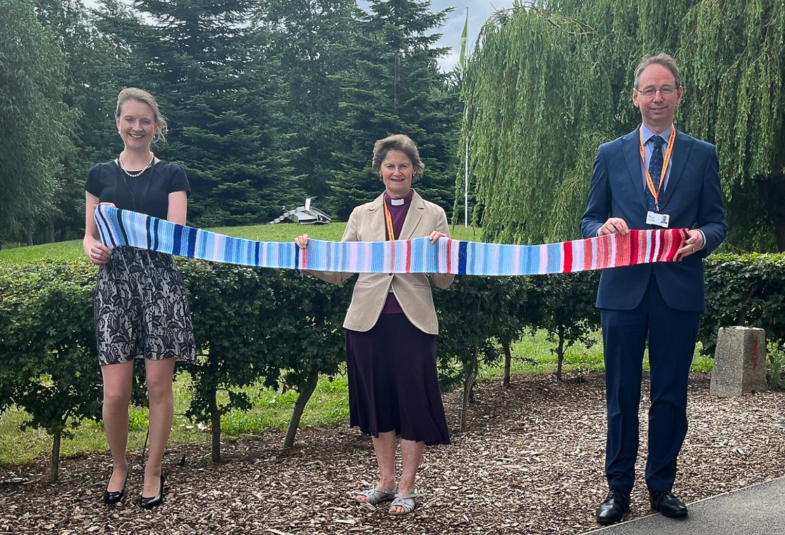11/07/2023

The Church of England’s General Synod has called for renewed action from the Church and Government to tackle the impact and causes of climate change.
A motion brought by the Diocese of Oxford calls on all parts of the Church to review policies and procedures in order to give due priority to creation care, and asks the Government to review planning regulations to aid the installation of renewable technology on church buildings that are listed or in conservation areas, was passed by a substantial majority of Synod members.
It also commends the National Investment Bodies for their decisions to divest from fossil fuels, calls for regular prayer, and encourages the opportunity for confirmation candidates to make commitments to safeguard the integrity of creation.
Ahead of the vote, Synod members were briefed on the aspects of the motion which have made positive progress since the motion was passed by Oxford Diocesan Synod in March 2020: including the Church of England’s Routemap to Net Zero by 2030 and announcements by the National Investing Bodies to disinvest from fossil fuels.
Synod members also heard from National Advisors on Net Zero and Environmental Affairs who said the recent approval of solar panels on the roof of King’s College Cambridge could prompt acceptance of more renewable installations elsewhere.
The Diocese of Oxford has already taken local action to address the climate crisis, including the approval of £10 million expenditure on environmental works to improve the carbon footprint of vicarages in the Thames Valley, synod heard, before voting for an amendment from Jack Shepherd (Liverpool) for all Church institutions to make similar expenditure commitments.
The motion asks for national services such as the Parish Buying scheme to build capacity to put cost-effective utilities and supplies within the reach of all parishes.
Additionally, it asks Bishops and the Liturgical Commission to encourage Confirmation services to consider including an additional question, inviting candidates to commit to striving to safeguard the integrity of God’s creation, and sustain and renew the life of the earth.
Introducing the motion, the Bishop of Reading, Olivia Graham, said: “We have the rest of this decade to take decisive action. The motion challenges us in all areas of life, from finances to buildings and political advocacy. We must not kick this can down the road for future generations to deal with.
“There is no greater issue facing society today than runaway climate change. Our Church, with the level of resources, reach and influence we have, must be on the frontline of the battle to save God’s creation."
Pictured: The Bishop of Reading, Olivia Graham, who introduced the motion, with Hannah Mann and Mark Humphriss holding up a climate change stripes scarf, showing temperature change over the period since 1850.
More information
The full Synod motion, with amendments, is as follows:
‘That this Synod, affirming the fifth mark of mission, concerned by the scientific evidence that climate change is proceeding at a rapid rate and by the impact of climate events, and seeking to build on the decisions taken with respect to GS 2159:
- commend the recent disinvestment announcements by the Church Commissioners for England and Church of England Pensions Board, and urge each of the National Investing Bodies of the Church of England to prioritise and scale up investment in renewable energy and other climate solutions, in line with their fiduciary duties, and ask each to report back on progress to General Synod each quinquennium;
- urge all parts of the Church of England to review their relevant policies and procedures, in order to ensure that they are up to date and give due priority in creation care;
- urge the Church of England to further develop pre- and post-ordination and lay training to deepen understanding in how care for the earth is part of our Christian faith and a missional imperative;
- urge all parts of the Church of England to seek to support, through prayer, advocacy and practical action, the poorest in the world who are suffering the most from the impacts of climate change, in the awareness that our nation has been among those who have benefited most from the emissions that have caused the crisis;
- commit earnestly and regularly to pray - and to promote prayer - about the climate and wider environmental crisis.
- call upon all institutions of the Church of England to make urgent practical preparations for the delivery of substantial reduction of the Church’s carbon footprint, including, but not restricted to, the following immediate actions in respect of Church buildings:
(i) ensuring that the NCIs are adequately resourced to provide DACs, Buildings Departments, Education Departments and others with authoritative national guidance notes, advice and training on key technical and procedural questions relating to adaptation of buildings for the net zero target; and
(ii) ensuring that Parish Buying and other national-level entities have the capacity to engage with manufacturers and suppliers of products and processes recommended for making our buildings more efficient, with a view to using the scale of the national net zero project to achieve both sympathetic design and economies of scale on cost.
(iii) commit expenditure, reflective of the £10 million committed by Oxford Diocese, on environmental works to improve the carbon footprint of vicarages.
- request Bishops and the Liturgical Commission to encourage confirmation services to include an additional question: ‘Will you strive to safeguard the integrity of creation, and sustain and renew the life of the earth?’
- ask that HM Government reviews the weight given to the environmental public benefit in planning regulations to facilitate the installation of renewable technologies, including for buildings that are listed or in conservation areas.’
The motion was passed with votes recorded as follows:
For: 256
Against: 36
Abstained: 16
Read the full paper on this motion.